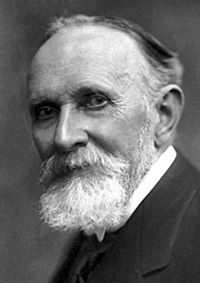Carl Spitteler facts for kids
Quick facts for kids
Carl Friedrich Georg Spitteler
|
|
|---|---|
 |
|
| Born | 24 April 1845 Liestal, Switzerland |
| Died | 29 December 1924 (aged 79) Lucerne, Switzerland |
| Occupation | Poet |
| Language | German |
| Nationality | Swiss |
| Education | University of Basel, Heidelberg University |
| Notable awards | Nobel Prize in Literature 1919 |
Carl Friedrich Georg Spitteler (born April 24, 1845 – died December 29, 1924) was a famous Swiss poet. He won the important Nobel Prize for Literature in 1919. He received this award for his amazing long poem, Olympian Spring. His poems often explored both sad and brave themes.
Contents
About Carl Spitteler
Early Life and Education
Carl Spitteler was born in Liestal, Switzerland. His father worked for the government as the Federal Secretary of the Treasury. Young Carl went to school in Basel. There, he learned from famous teachers like Wilhelm Wackernagel and Jakob Burckhardt.
He studied law at the University of Zurich starting in 1863. Later, from 1865 to 1870, he studied theology. He attended universities in Zurich, Heidelberg, and Basel. Even though he could have become a pastor, he chose a different path. Carl realized he wanted to be an epic poet.
Becoming a Writer
From 1871 to 1879, Carl worked as a tutor in Russia, spending some time in Finland. After that, he became an elementary school teacher in Bern and La Neuveville. He also worked as a journalist and editor for newspapers.
In 1883, Carl Spitteler married Marie op der Hoff. She had been one of his students in Neuveville.
Important Works and Ideas
In 1881, Spitteler published an allegoric poem called Prometheus and Epimetheus. He used the pen name Carl Felix Tandem for this work. The poem used the Greek myths of Prometheus and Epimetheus to show differences between ideals and strict rules.
A famous psychologist, Carl Jung, found this poem very interesting. Later in his life, Spitteler rewrote this poem. He published it under his real name in 1924, calling it Prometheus der Dulder (Prometheus the Sufferer).
In 1882, he released Extramundana, a collection of poems. By 1885, he stopped teaching to focus on writing full-time. His books then started coming out quickly. In 1891, he published Friedli, der Kalderi, a collection of short stories.
Olympic Spring and Other Writings
Between 1900 and 1905, Spitteler wrote his powerful epic poem, Olympischer Frühling (Olympic Spring). This long poem mixes fantasy, nature, religion, and myths. It explores how humans think about the universe.
His other prose works include Die Mädchenfeinde (Two Little Misogynists, 1907). This book shares stories from his own childhood. He also wrote Imago (1906), a novel that looks at how our unconscious thoughts affect creative people.
Later Life and Legacy
During World War I, Carl Spitteler spoke out against the pro-German views of many German-speaking Swiss people. He shared his thoughts in an essay called "Unser Schweizer Standpunkt".
In 1919, he received the Nobel Prize in Literature. Carl Spitteler passed away in Lucerne, Switzerland, in 1924. His writings and personal items are kept in important archives in Switzerland.
Carl Spitteler in Pop Culture
The famous psychologist Carl Jung said that his idea of the 'Anima' (a part of the human mind) was inspired by what Spitteler called 'My Lady Soul'. Musician David Bowie, who was interested in Jung's ideas, wrote a song in 1973 called "Lady Grinning Soul".
Works
- Prometheus und Epimetheus (1881)
- Extramundana (1883, seven cosmic myths)
- Schmetterlinge ("Butterflies", 1889)
- Der Parlamentär (1889)
- Literarische Gleichnisse ("Literary Parables”, 1892)
- Gustav (1892)
- Balladen (1896)
- Conrad der Leutnant (1898)
- Lachende Wahrheiten (1898, essays)
- Der olympische Frühling (1900–1905, revised 1910)
- Glockenlieder ("Grass and Bell Songs", 1906)
- Imago (1906, novel)
- Die Mädchenfeinde (Two Little Misogynists, 1907)
- Meine frühesten Erlebnisse ("My Earliest Experiences", 1914, biographical)
- Prometheus der Dulder ("Prometheus the Suffering”, 1924)
See also
 In Spanish: Carl Spitteler para niños
In Spanish: Carl Spitteler para niños
 | Roy Wilkins |
 | John Lewis |
 | Linda Carol Brown |

